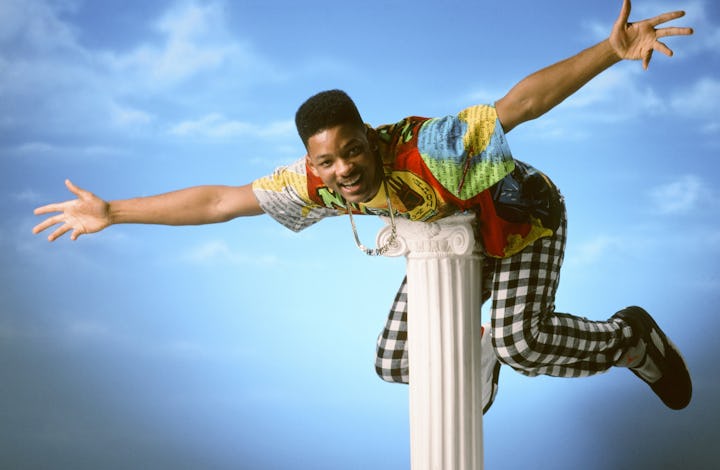33 Years Ago, One Family Sitcom Changed The Conversation About Being Black In America
Billed as fresh, this show ended up being so much more.

In the late summer of 1990, the fact that NBC would debut a prime-time sitcom starring a rapper was nearly unbelievable to my 10-year-old mind. Until that point, the only sitcom I watched was The Cosby Show, which, as one of the only television shows featuring a Black family, was appointment viewing in our home. And as much as I loved The Cosby Show as a kid, The Fresh Prince of Bel-Air felt like a tailor-made show for me. And thirty-three years ago, I wasn’t alone. On September 10, 1990, this enduring family sitcom debuted and began changing the way everyone talked about the experience of being Black.
At the time, Will Smith held down an interesting space in the pop culture Venn Diagram. On the one hand, he was very much considered a legitimate rapper. He and DJ Jazzy Jeff toured with Run DMC and Public Enemy, and they also won the first Grammy for a rap song with "Parents Just Don't Understand.” But unlike other popular rap groups at the time, such as N.W.A. and the aforementioned Public Enemy, DJ Jazzy Jeff and the Fresh Prince had greater crossover potential due to their playful swear-free lyrics and comedic music videos. NBC managed to harness, and market their family-friendly to perfection. Not only did over 20 million people tune in to The Fresh Prince of Bel-Air series premiere on September 10, 1990, but viewership levels remained consistent throughout that first season.
Alfonso Ribeiro as Carlton Banks, Will Smith as William 'Will' Smith, Don Cheadle as Ice Tray.
On its face, the show was funny enough to hold just about anyone’s attention. As it turns out, Will Smith is one of his generation's most gifted and decorated actors. And Alfonso Ribeiro as Carlton — who Ted Lasso named “the greatest physical comedian of the 19th, 20th and 21st century” — is still a charismatic wonder, as host of both America’s Funniest Home Videos and Dancing With The Stars.
Beyond the laughs, however, the show’s cultural impact is still felt today because of the questions that it explored about what it really means to be Black in America. Will Smith’s character in Fresh Prince was perfectly positioned to ask many of those questions as he not only oozed street cred but was charismatic enough to have fun, stay true to who he was, and push back against systems and norms when transported to the rich and famous Bel Air lifestyle. In a lot of ways, Will was living every Black kid’s dream.
But the show remained grounded in reality by incorporating resonant experiences. One early example came just six weeks in when, during an episode titled “Mistaken Identity,” Will and Carlton are racially profiled and pulled over by a police officer for “stealing” a Mercedes Benz that they had permission to drive.
After Uncle Phil gets the boys out of jail, Will and Carlton end up in an argument about racial profiling with Carlton adamant from his position of economic privilege that the justice system is not flawed. His mind is only swayed when Uncle Phil recounts similar experiences he has had, helping Carlton understand that racial profiling is more common than he realizes. A powerful episode on its own accord, the timing was spot on as it aired less than six months before widespread unrest following Rodney King’s victimization by Los Angeles Police Department officers.
A scene from “Mistaken Identity,” in The Fresh Prince of Bel-Air.
Two episodes prior, in “Not with My Pig, You Don't,” Phil struggles with how he will be perceived if people find out about his poor upbringing in rural North Carolina. As a prominent Black judge with predominantly white colleagues, he had worked very hard to distance himself from that part of his life story. In juxtaposition to Will, he had to learn how to take pride in where he came from as well as who he had become.
Similar moments of depth sprung up regularly throughout the show’s six-season run, though many episodes relied more on typical high-school hijinks than heavier-handed life lessons. But the show always remained substantive enough to keep audiences thinking and feeling on a deep level.
And no Fresh Prince of Bel-Air conversation is complete without mentioning the theme song. Written in just 15 minutes by Smith and DJ Jazzy Jeff, the track stands up as not only one of the best theme songs of all time but as one of the most popular songs of all time. “It’s sort of comfort food,” Fresh Prince of Bel-Air co-creator Andy Borowitz told EW. “You know, there’s no way to measure this, but is there a hip-hop song that more people around the world know all the words to? Probably not.”